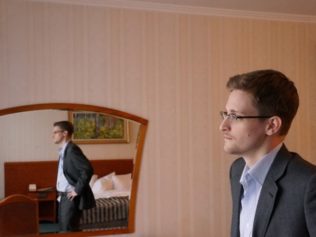The trial of Pfc. Bradley Manning began yesterday with prosecutors alleging that in leaking the largest cache of classified materials in U.S. history, Manning worked more closely with WikiLeaks founder Julian Assange than previously known and that the documents assisted al-Qaida leader Osama bin Laden.
In their opening statement, prosecutors said during the trial they will present evidence that bin Laden requested and obtained from another al-Qaida member, the Afghanistan battlefield reports and U.S. State Department cables published by WikiLeaks.
“This is a case about a soldier who systematically harvested hundreds of thousands of documents from classified databases and then dumped that information onto the Internet into the hands of the enemy,” prosecutor Capt. Joe Morrow said.
According to Morrow, the case is “about what happens when arrogance meets access to sensitive information.”
But Manning’s lawyers disputed this portrayal of Manning, saying instead that he was a “young, naive but good-intentioned” soldier whose struggle to fit in as a gay man in the military made him feel he “needed to do something to make a difference in this world.”
Earlier this year, Manning, 25, pleaded guilty to turning over hundreds of thousands of documents to the website WikiLeaks, which could bring him 20 years behind bars. But the military was not satisfied with that admission, pressing ahead with a court-martial on more serious charges, including aiding the enemy, which carries a possible life sentence.
Defense attorney David Coombs said Manning was “a humanist,” a word that was engraved on his custom-made dog tags, and he struggled to do the right thing as an analyst in Baghdad, where he had access to hundreds of millions of documents. Coombs said Manning only selectively leaked material, such as the unclassified video of a 2007 U.S. Apache helicopter attack that mistakenly killed civilians, including a Reuters photographer.
“He believed this information showed how we value human life. He was troubled by that. He believed that if the American public saw it, they too would be troubled,” said Coombs, who chose not to address whether bin Laden ever saw any of the material.
Manning has contended he did not believe the leaked information would harm the U.S.
Over the course of a trial predicted to last all summer, the government is expected to call 141 witnesses while the defense is expected to call 46.
Manning chose to have the court-martial case heard by a judge, Col. Denise Lind, instead of a jury. Lind will close large portions of the trial to reporters and the public because they will be discussing much classified evidence.
Assange, who is still holed up in the Ecuadorean Embassy in London to avoid extradition to Sweden on sex-crimes allegations, said in a statement yesterday about the Manning trial: “This is not justice; never could this be justice. The verdict was ordained long ago. Its function is not to determine questions such as guilt or innocence, or truth or falsehood. It is a public relations exercise, designed to provide the government with an alibi for posterity. It is a show of wasteful vengeance; a theatrical warning to people of conscience.”
Manning had at least 20 supporters in the courtroom, including Princeton University professor and civil rights activist Cornel West and Medea Benjamin, a member of protest group Code Pink. Benjamin alleged that the government purposely chose a small courtroom to give the impression that Manning had less support than he really has.
“It’s important to support him,” said Anne Wright, a retired Army colonel. “I spent 29 years in the military, and what Bradley Manning has done is exposed government corruption and brutality.”
During the opening statements, prosecution lawyers made frequent references to Assange and suggested that Manning built close ties to the Wikileaks founder over a six-month period in 2009 and 2010. They claimed that Assange guided Manning to which classified documents to leak, advised him on how to avoid detection, and even involved him in the WikiLeaks editing process.
Those allegations could have deep implications for Assange as well, indicating the extent of the case the government would pursue against him, such as the allegation that documents wound up in the hands of bin Laden, who could have used them to hurt the U.S.


